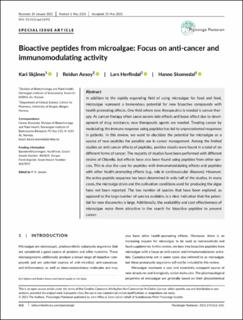Bioactive peptides from microalgae: Focus on anti-cancer and immunomodulating activity
Peer reviewed, Journal article
Published version
Permanent lenke
https://hdl.handle.net/11250/2832501Utgivelsesdato
2021-06-03Metadata
Vis full innførselSamlinger
Originalversjon
Physiologia Plantarum : An International Journal for Plant Biology. 2021, 173 (2), 612-623. 10.1111/ppl.13472Sammendrag
In addition to the rapidly expanding field of using microalgae for food and feed, microalgae represent a tremendous potential for new bioactive compounds with health-promoting effects. One field where new therapeutics is needed is cancer therapy. As cancer therapy often cause severe side effects and loose effect due to development of drug resistance, new therapeutic agents are needed. Treating cancer by modulating the immune response using peptides has led to unprecedented responses in patients. In this review, we want to elucidate the potential for microalgae as a source of new peptides for possible use in cancer management. Among the limited studies on anti-cancer effects of peptides, positive results were found in a total of six different forms of cancer. The majority of studies have been performed with different strains of Chlorella, but effects have also been found using peptides from other species. This is also the case for peptides with immunomodulating effects and peptides with other health-promoting effects (e.g., role in cardiovascular diseases). However, the active peptide sequence has been determined in only half of the studies. In many cases, the microalga strain and the cultivation conditions used for producing the algae have not been reported. The low number of species that have been explored, as opposed to the large number of species available, is a clear indication that the potential for new discoveries is large. Additionally, the availability and cost-effectiveness of microalgae make them attractive in the search for bioactive peptides to prevent cancer.

